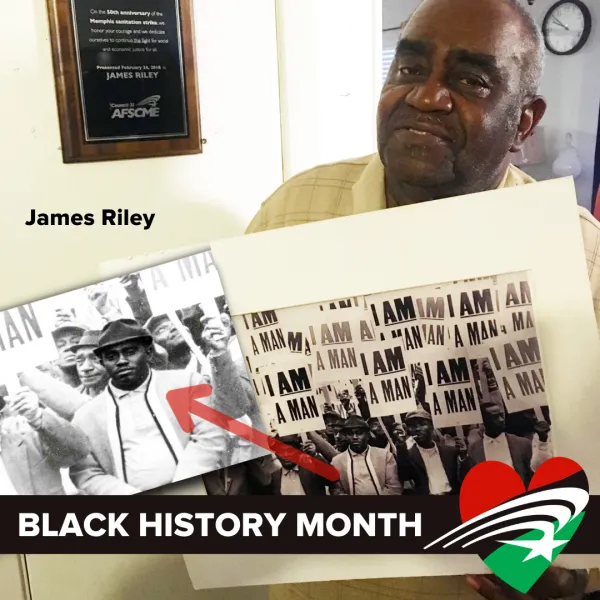50 years after marching with MLK

It was a strike by sanitation workers fighting to form their union with AFSCME that brought Dr. Martin Luther King, Jr. to Memphis, Tennessee in the spring of 1968. One of the few surviving Memphis strikers, James Riley, now lives in Chicago and remembers those days vividly.
Then in his mid-20s, Riley picked up trash at commercial buildings from 6 p.m. to 2 a.m. He was paid a dollar an hour. “We worked like hell lifting those 55-gallon drums and the No. 3 tubs,” he told Smithsonian magazine. “You’d put that tub on your shoulder and it would leak on you and you’d smell like garbage.”
Disgusted with the low pay and poor, unsafe working conditions, “We were trying to get a union in the Public Works department,” Riley remembers.
On Feb. 1, 1968, two sanitation workers were crushed to death in the back of a malfunctioning garbage truck, the likes of which employees had long warned the city about. The deaths were why “we finally went on strike,” Riley says. But when they did, the white mayor “Henry Loeb said he didn’t care if garbage piled up in the black neighborhoods.”
Reflecting their demand to be treated with dignity and respect, sanitation workers marched with placards that read, “I Am A Man.” The city responded with violence. “When we marched, they threw Mace on us,” Riley recalls.
Dr. King saw the workers’ struggle as part of the civil rights movement, and he came three times to Memphis to address the workers and march with them.
The fabled leader “was very brilliant,” Riley says, “but he didn’t talk down to anyone. And he’d always have a smile on his face. We’d be talking and laughing—not a lot, just a little bit, because he was very sincere in what he was doing. And when he said nonviolence, that’s what he meant: nonviolence.”
On the night of April 3, King’s associate Ralph Abernathy was slated to speak to a union meeting at the Mason Temple. King was ill and stayed at the Lorraine Motel.
There was a terrible rainstorm, and when Abernathy arrived at the church to find a hardy group of 1,000 strikers and their supporters had braved the downpours, he called King to come over and address them.
“I had intended to get there,” Riley remembers, but “the streets were flooded. I drove two blocks and the water was too deep for my car. I had to turn around.”
That night King delivered his prophetic “Mountaintop” speech, declaring, “I may not get there with you, but I want you to know tonight that we, as a people, will get to the promised land.”
The next day, Riley was sorting donations of food at the Clayborn Temple—a home base for the union during the strike—when “somebody called and told us Dr. King had been shot” outside the motel just half a mile away.
“I was hurt, really hurt,” Riley says. “I shed quite a few tears. They done killed him, for what? He was trying to help the people.”
Two weeks after King’s death, the city agreed to recognize the union and settle the first contract. Riley served on the union bargaining committee.
“I was part of the negotiations. I helped get that contract,” he recalls. “It was a pay increase, and working conditions changed. It was worth it.”
The next year, Riley moved to Chicago’s south side. He went to work for more than three decades at Oscar Mayer and then the Entenmann’s bakery, both union jobs.
“If I had it to do all over, I would,” Riley says. “The union is a help—the pay, what kind of contract you’ve got, you’re treated much better with a union.”
In February 2018, AFSCME Council 31 and the Illinois labor movement honored Riley at the Working People’s Day of Action rally in Chicago. In April that same year he traveled to Memphis to participate in the 50th anniversary commemorative activities AFSCME sponsored there.
